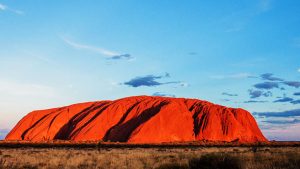Home » Commentary » Opinion » Uluru spotlights prosperity question
· Ideas@TheCentre

 Progressives have been celebrating the closure of the Uluru climb as a triumph for Indigenous rights. The reality is such politicisation detracts from the deep spiritual significance of the closure for the current Traditional Owners. As Australians, we are not strangers to acts of politicisation; but ultimately all it contributes to is further divide and less understanding.
Progressives have been celebrating the closure of the Uluru climb as a triumph for Indigenous rights. The reality is such politicisation detracts from the deep spiritual significance of the closure for the current Traditional Owners. As Australians, we are not strangers to acts of politicisation; but ultimately all it contributes to is further divide and less understanding.
I shared the closing celebrations with those of my Anangu family through my connection with one of the many dreaming stories that come together to create Uluru itself. My connection comes through my great grandfather named after the ‘Mala Jukurrpa’ (Mala dreaming) which connects us Warlpiri to the Anangu. And many are right that we do not own the land but are deeply responsible for its spiritual maintenance — which was the main reason behind the closure of the climb.
The climb was a potential source of income that has been diminished or closed off now, according to some. There are those who suggested an alternative may have been that Parks & Wildlife in partnership with Traditional Owners could have established paid guided tours with safety equipment. This idea similar — much like the climbing of the iconic Sydney Harbour Bridge — would have provided a means of controlling climber numbers and better safety.
But the decision to close the climb was unanimously determined based on one of three pre-conditions being met: that once the percentage of Uluru visitors who intended to climb dropped below 20%. In fact, at the time the decision was made in November 2017, only 5% of visitors actually made the climb.
Will it impact economic development for the local community? My discussions with Yulara resort staff indicated that bookings for March-April 2020 remain around the same as for the same period in 2019. I was told the majority of the 250,000 visitors per year are there for a cultural experience.
If this is the case, the resort (owned by the Indigenous Land Corporation and Parks and Wildlife) has to invest in opportunities. Due to the township lease signed over to Traditional Owners, the Anangu are in a strong position to create economic development opportunities.
They must make the most of those opportunities in order to thrive if cultural tourism is now the main drawcard. To avoid becoming another example of ‘culture’ holding the Indigenous community back economically, the Anangu must develop ongoing partnerships and collaborations with Parks, the resort and private enterprise.
Ultimately the supply chain for cultural tourism must be supported. This includes better educating Anangu children in both the modern world and for their families to have the strength to teach their culture in a healthy and fostering environment.
Uluru spotlights prosperity question